Kashmiri Pandits: The Forgotten Victims
Members of Roots In Kashmir a Kashmiri Pandit Group campaigning for restoration of human rights and dignity in Kashnmir during a protest to mark the Kashmiri Pandit Exodus day and the 24th anniversary of their forced exile in New Delhi on 19th January,2014.
Three
things cannot be long hidden: the sun, the moon, and the truth. –
Buddha In Kashmir there is no common truth. Every individual perhaps has
a distinct version of truth. The conflict ridden valley, however has
over the past two decades hidden one significant truth, that of the
forced displacement of Kashmiri Pandits in 1990.As India was inching towards reforms to
transform its economic outlook in 1989, its northern-most state of
Jammu & Kashmir faced a sudden violent rebellion from separatist
groups who took up arms against the state machinery. While V.P. Singh
took hold of the Prime Minister’s Office (PMO) in December that year,
situation had turned grave as terrorists aided by Pakistan began
selectively targeting the minority Kashmiri Pandits.The Pandits’ story
today is one of the tragic and often overlooked catastrophes of a
conflict that has claimed thousands of lives, and forced hundreds of
thousands from their native land into exile in their own country.
…
The roots of this tragedy are immersed
in 1986 with a well-planned strategy to execute Hindus from the valley.
By 1990, the population saw their age old temples turned to ruins and
lives at risk.Pakistan stepped up their campaign against India, new
Islamist terror outfits swiftly mushroomed in the state; even as
Jamait-e-Islami financed all madarsas to poison them against the
minority Hindus and India, Pakistan further dictated youth to launch
Jihad against India.
…
A terror strike so meticulously planned
that its unprecedented display was terrifying. The camps in Pakistan
Occupied Kashmir (POK) began to provide training to innumerable Muslim
men; India witnessed the emergence of the bloodiest Kalashnikov culture
in the valley.Almost after two decades of the exodus, the Abdullah
family – who are politically the strongest family of J&K – broke
their silence over the issue. Omar Abdullah wrote a detailed post on his
official blog blaming the local Muslim population to be ‘mute
spectators’ to the forced exodus.
24 years on, nothing has changed for the exiled Kashmiri Pandits
The Government of India has failed Kashmiri Pandits as they are still living as refugees in their own country.The state as well as the central government has not taken substantial measures till date for the return of Kashmiri Pandits back to the valley, says Varad Sharma.Exactly 24 years ago, on January 19, 1990, the biggest ever exodus of people happened since the partition of India.
The minority Hindus of Kashmir, Kashmiri Pandits, fled the valley leaving behind their homes and homeland to save themselves from persecution at the behest of Islamic extremists/terrorists.
Around four to five lakh Kashmiri Pandits were displaced due to militancy in Kashmir valley. Every year since that day, Kashmiri Pandits commemorate January 19 as Kashmiri Pandit Holocaust/Exodus Day, hoping to go back to their homes one day.Terrorism in Kashmir valley started with the ethnic cleansing and genocide of Kashmiri Pandits in 1989-1990. Ethnic cleansing refers to an attempt to create ethnically homogeneous geographic areas through the expulsion or forcible displacement of persons belonging to particular ethnic groups.United Nations defines ethnic cleansing as rendering an area ethnically homogeneous by using force or intimidation to remove from a given area, persons of another ethnic or religious group.
Displaced Kashmiri Pandit women pray for peace and an early return home at an annual Hindu festival: BBC.
The so-called freedom movement (Azaadi) in Kashmir was joined by many local Kashmiri Muslims (and not all). They opted for guns for the so-called Azaadi which never was attained. The main purpose of terrorism in Kashmir was to create a valley homogenous in its religious (read Islamic) character.The minority Kashmiri Pandits were forced to leave the valley to create such homogeneity. If the majority community of the valley had not supported the insurgency, there probably wouldn’t have been any exodus of the minority community.Ethnic cleansing sometimes involves the elimination of all physical vestiges of the targeted group through the obliteration of monuments, cemeteries, and houses of worship.Death or displacement may also be involved in ethnic cleansing where a population is identified for removal from an area or a region. With the rise of insurgency and Islamic extremism in Kashmir, houses of minority Hindus were burned and temples were destroyed. Also, notices were pasted on the walls of Kashmiri Pandit houses telling them to leave the Kashmir valley or to die.
Displaced Kashmiri Pandits seek Modi’s intervention
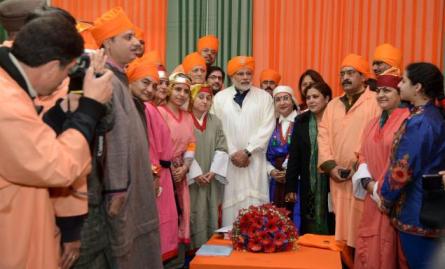
A
delegation of Kashmiri Pandits meet BJP Prime Ministerial candidate
Narendra Modi and submitted a memorandum at the party’s National council
meeting in New Delhi on January 19, 2014
Twenty four years to the day when they were forced to flee from the Valley, a delegation of Kashmiri Pandits submitted a memorandum to BJP’s prime ministerial candidate Narendra Modi in the Capital on Sunday seeking his intervention for their return to their homeland.Interacting with the delegation, Mr. Modi said it was on January 19, 1990 that Kashmiri Pandits were made to leave their homeland. It was an attack on not only a community but their centuries old tradition, he said. What the displaced Pandits are facing today is not just a fight against injustice meted out to them, but are also fighting for the reinstatement of their lost tradition back in the Valley, he added.Mr. Modi told the delegation that injustice to Kashmiri Pandits is not only an attack on their rights but an attack on our national ideal of ‘Sarva Pantha Sambhav’.“No words will ever explain the extent of suffering Kashmiri Pandits experienced. Justice towards the community remains our firm commitment,” he told the delegation.
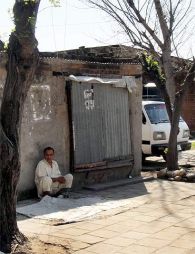
A man sits by a shop at a camp for Kashmiri migrants in Jammu
The delegation said the targeted killing of members of the Hindu Minority community that led to mass exodus has resulted in the change of the demographic profile of the State, yet “no commission was constituted nor was any enquiry ordered into the causes of extirpation and rise of fundamentalist-anti-India insurgency in Kashmir.”
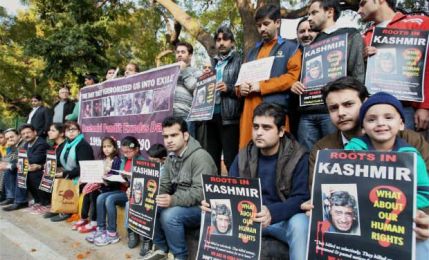
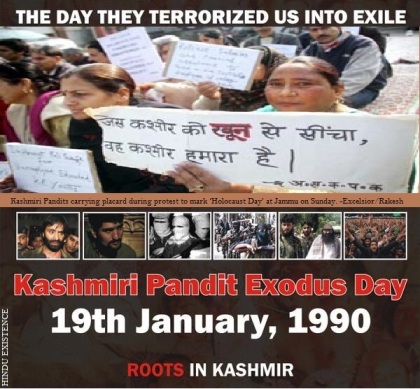
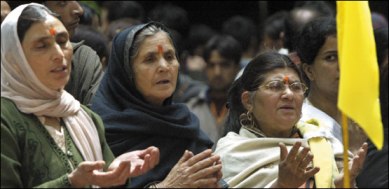
No comments:
Post a Comment